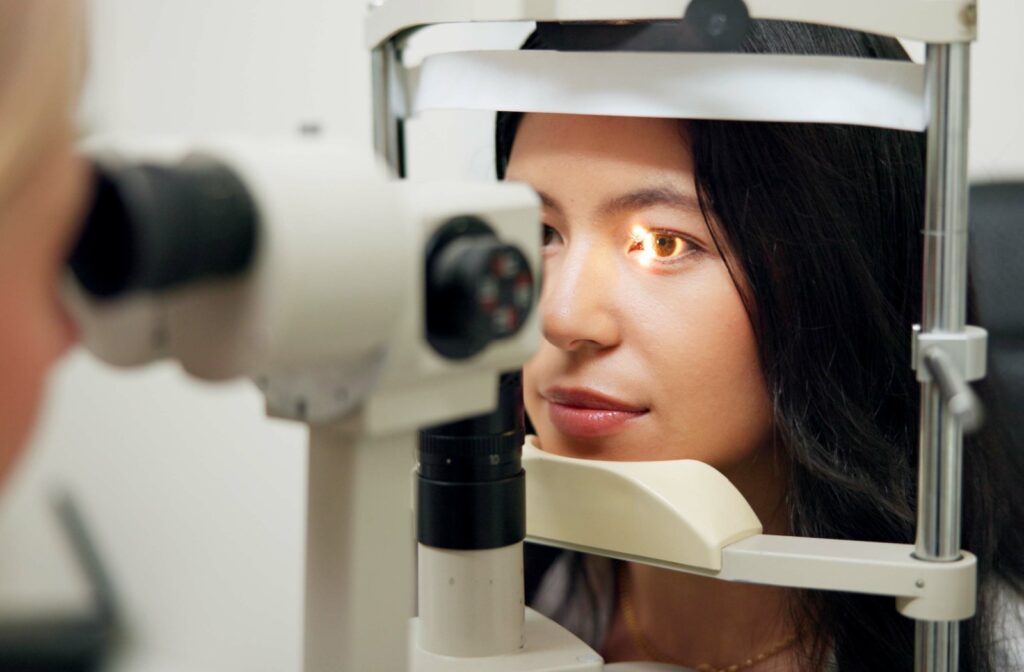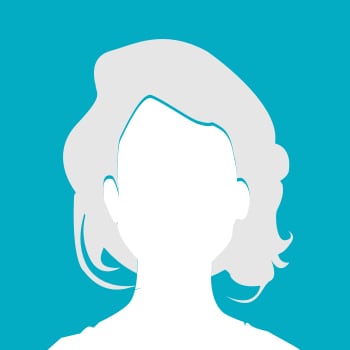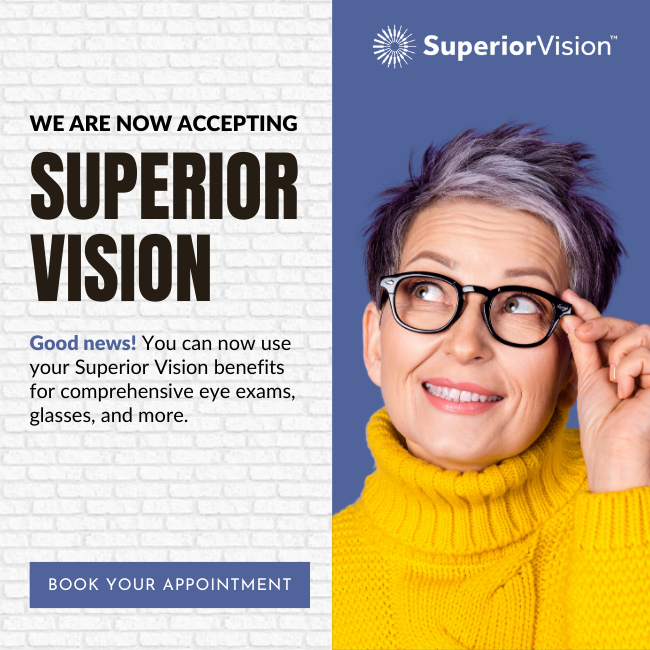An eye exam is part of maintaining vision health and can help to detect any potential issues that might affect your eyesight. However, many people overlook some important habits before their eye exam that can impact the accuracy of the results.
At Restore Vision Center, we want to help you get accurate results from your appointment by guiding you on what not to do before your eye exam, including skipping your regular routine, wearing makeup, consuming caffeine, neglecting hydration, failing to disclose symptoms, and rushing the appointment.
6 Tips to Prepare for Your Eye Exam
1. Don’t Skip Your Regular Routine
You may think skipping your normal routine or wearing contacts or glasses just before the appointment will help “reset” your vision for an eye exam, but it can sometimes make things worse. Make sure to wear your usual prescription glasses or contact lenses on the day of your appointment. This can help your eye doctor assess your vision accurately.
When you skip wearing your contacts or glasses, your vision may be impaired, and your doctor might not get a clear picture of your visual acuity. If you normally wear contacts, make sure to wear them in the morning and avoid wearing them right before your appointment, as this can cause discomfort or dryness, sometimes affecting the exam results.
2. Don’t Wear Makeup or Apply Eye Cream
If you’re heading to the eye doctor, try to avoid wearing heavy makeup around the eyes, including mascara, eyeliner, or eye shadow. This can interfere with the tests, especially if you’re having a dilated eye exam. The eye drops used during a dilation can mix with makeup and potentially cause irritation. Additionally, makeup may smear or cause discomfort during the exam.
Eye creams and lotions should also be avoided, as they can interfere with the accuracy of certain tests. These products might also cause the eye’s surface to become slippery, preventing the optometrist from getting a clear and precise measurement of your eye pressure.
3. Don’t Consume Caffeine or Stimulants
Consuming caffeine or other stimulants right before an eye exam can elevate your heart rate and cause slight fluctuations in your eye pressure. This can potentially skew the results of your eye exam, especially if you’re being tested for glaucoma or other vision issues that involve measuring intraocular pressure (IOP). Try to avoid coffee, energy drinks, and any other sources of caffeine for at least 2-3 hours before your appointment.
The effects of caffeine can also make you jittery, which can impact your ability to focus during vision tests, especially when it comes to reading the eye chart or determining the right prescription.
4. Don’t Skip Hydration
While you should avoid caffeine, that doesn’t mean you should skip drinking water. Staying hydrated helps the health of your eyes, as dehydration can affect the moisture levels in your eyes, leading to dryness and discomfort during the exam. This can make it difficult for the eye doctor to assess your eyes properly, especially if you are experiencing dry eye symptoms that can affect the tests.
Be sure to drink water before your eye exam to help keep your eyes comfortable and hydrated throughout the process.
5. Don’t Expect Results Without Full Disclosure
Being open and honest with your eye doctor about any symptoms you may have increases the chance of getting an accurate diagnosis. If you’re experiencing headaches, blurry vision, eye pain, or other symptoms, make sure to share that information. Failing to provide information can affect the outcome of your exam, making it harder for your doctor to develop a treatment plan for your needs.
Additionally, don’t hold back if you’ve recently changed medications or experienced any changes in your lifestyle. Certain medications can cause side effects that affect your vision, and your doctor needs to have a full understanding of your health history.
6. Don’t Rush the Appointment
Eye exams involve careful testing, so take your time for more accurate results. If you’re in a hurry or feeling stressed, you might not be able to provide your doctor with accurate answers. Take your time during the exam, ask questions, and let your doctor know if you’re experiencing any discomfort. This will help you fully understand the results.
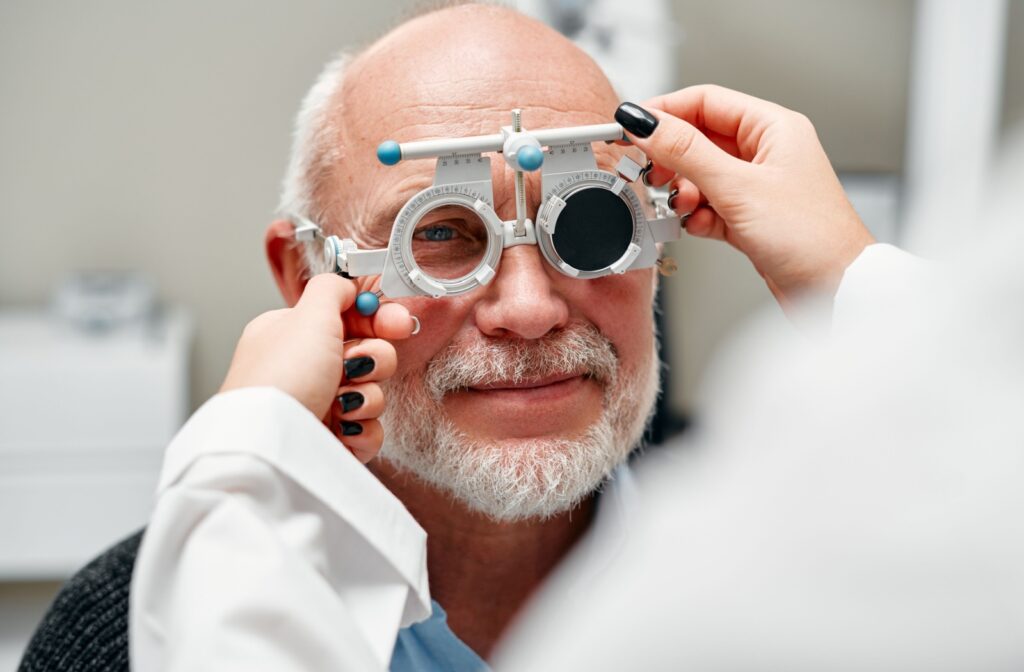
Should I Rest My Eyes Before an Eye Exam?
Yes, resting your eyes before your eye exam is a good idea. If you’ve been staring at a screen for a long time or doing close-up work, it’s recommended to give your eyes a break. Overuse of your eyes can make them tired or strained, which can impact the results of certain tests. Resting your eyes for a little while before your appointment can help the exam go more smoothly.
Does Lack of Sleep Affect Eye Tests?
Lack of sleep can affect the results of your eye exam. If you’re tired, your eyes may not function at their best, leading to blurry vision, eye strain, or other symptoms. Sleep supports overall eye health, and fatigue may temporarily affect your visual perception, potentially influencing your test results.
How Can I Improve My Eyesight Before an Eye Exam?
While you cannot drastically improve your eyesight in a short time, there are some things you can do to help your eye health leading up to your exam. Stay hydrated, get a good night’s sleep, and avoid eye strain by resting your eyes frequently. Eating foods rich in vitamins A, C, and E, along with Omega-3 fatty acids, can also support eye health.
Book Your Annual Eye Exam in TX Today!
Feeling comfortable during your eye exam may help you provide more accurate responses, leading to better results. Whether you need a new prescription or have concerns about your vision, a regular eye exam is a step toward taking care of your eyes. If it’s time for your annual eye exam, don’t wait—book your appointment today at Restore Vision Center in League City, TX!

